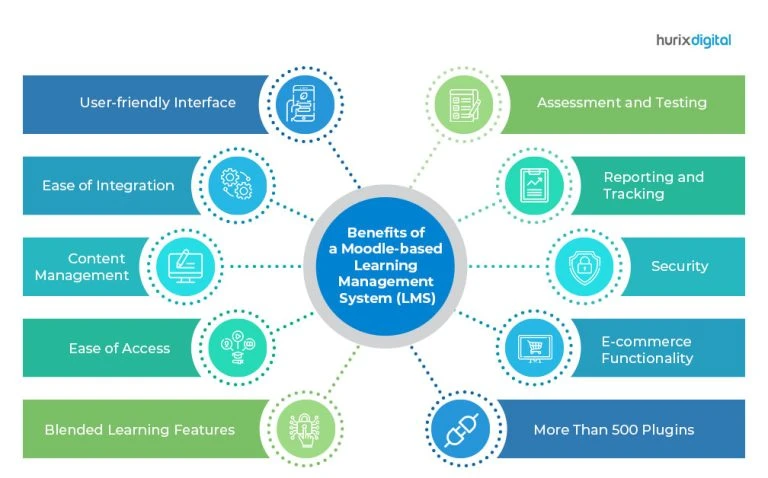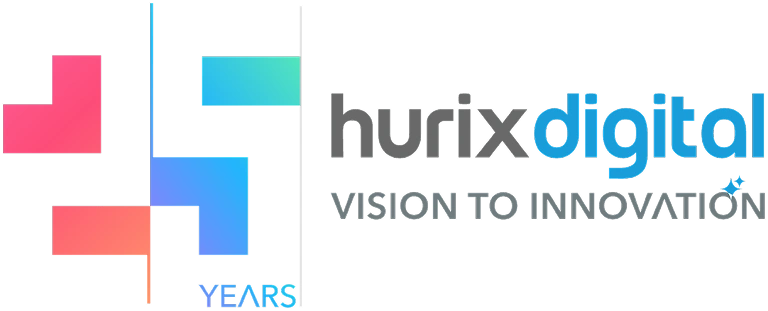
10 Benefits of Moodle-Based Learning Management System (LMS)
Summarize with:
In the present age, having a great Learning Management System (LMS) is more of a need than a want; already, technology has made online education and training quite easier than traditional methods of classroom teaching.
Presenting Moodle, a vibrant, open-source learning management system created to make eLearning easier and better for both businesses and teachers.
Due to its creation, Moodle became one of the most chosen solutions by organisations, schools, and even training providers for unique, engaging, and scalable learning.
What sets it apart is the wide-ranging functionalitarianism-Moodle from easy handling of content to most powerfully responsive reporting facilities. Thus, it meets many of the learned needs.
This article explains the 10 top advantages of a Moodle-based LMS and why it is one of the most trusted platforms for delivering impactful and flexible learning. Let’s dive in!
Table of Contents:
- What is an LMS?
- How to Choose the Best LMS?
- Top 10 Benefits of a Moodle-Based Learning Management System (LMS)
- Wrapping Up
What is an LMS?
Simply defined, a learning management system (LMS) is software used to administer learning and training of various courses to one or more learners.
More organizations worldwide are adopting learning management systems (LMS) to supplement their learning and training requirements. Compared to traditional classrooms, an LMS offers several advantages.
First, learning is not restricted to a classroom with an instructor explaining the course to all students together, irrespective of their learning abilities and capacities to assimilate, retain, and recall. An LMS allows learning at your own pace.
Moreover, the course contents are micro-nuggets, enabling the learners to master one concept at a time before proceeding to the next level. The second advantage is that learners are allowed to remove themselves from the boundaries erected by a physical classroom, thus learning anywhere, anytime, whether at their homes, offices or on the move.
Besides that, a cloud-based LMS can even be available for the learning of teams across the globe, sharing knowledge, and brainstorming.
The Moodle-based LMS is ideal for:
- Compliance training
- Online course development
- Competency-based training and management
- Onboarding training
- Workplace safety training
- Product and service launches
- Hiring, recruitment, and interview process
Also Read: 5 Reasons Why LMS Fails and How You Can Fix Them
How to Choose the Best LMS?
Whether you run a small business on the lookout for a budget-friendly option or a large organization wanting personalized solutions, this friendly approach will help you discover the LMS that suits your needs and lays a solid foundation for a meaningful learning experience.
Here are two essential steps to guide you in selecting the best LMS for your organization:
1. Understand What You Need from an LMS
Before exploring various LMS options, it’s crucial to define your organization’s specific learning and development requirements. Begin by considering these questions:
- What is the main objective of introducing an LMS?
- Who will utilize the platform? Employees, students, or clients?
- Is the LMS intended for compliance training, employee onboarding, or academic programs?
- How essential are mobile learning, gamification, and analytics features?
By understanding your needs, you can streamline your choices and concentrate on platforms that match your goals.
2. Compare Costs and Return on Investment (ROI)
Planning for the budget is always a crucial part of your finances. Open-source platforms such as the Moodle Learning Management System provide considerable financial benefits.
In contrast to exclusive LMS options, Moodle is available for free download and use, though expenses may arise from hosting, customization, and support.
Moodle’s flexibility, extensive plugin library, and active international community make it a cost-effective option for businesses of all sizes.
Evaluating your instructional objectives, technological requirements, and financial limits is necessary when choosing the right LMS. Make sure you comprehend the entire range of possible expenses, including any required upgrades and continuing maintenance.
3. Evaluate Scalability and Future Growth
An ideal LMS should not only meet your current needs but also support your organization’s growth and evolving learning requirements. Ask yourself:
- Can the LMS handle an increasing number of users as your organization expands?
- Does it offer features that can adapt to changing educational or training trends, such as AI-driven analytics or virtual reality integration?
- Is it compatible with emerging technologies and standards?
By factoring in scalability, you can ensure your LMS investment remains valuable and effective in the long run.
Top 10 Benefits of a Moodle-Based Learning Management System (LMS)

Here are the top advantages of choosing Moodle as your preferred Learning Management System:
1. User-Friendly Interface
An LMS provides self-descriptive navigation and an easy-to-use interface, and Moodle provides both. The less time and effort spent training users on how to use an LMS, the more user-oriented it is.
2. Ease of Integration
Learning management systems (LMS) based on Moodle are simple to integrate with a variety of business operations within the company, including payment processing, workflow management, talent management, compliance, human resource management, and customer relationship management.
Additionally, they contain capabilities that make it possible to share data across all geographical boundaries.
3. Content Management
A Moodle-based LMS can support all the latest eLearning standards, such as SCORM and Tin Can/xAPI. Besides, it also enables you to upload existing documents and videos and share materials and events between courses or learning paths.
And when it comes to content management, Moodle stands out with its flexibility. Educators and administrators can organize course materials efficiently, allowing for version control and updates in real-time.
The system also supports multimedia content, such as interactive videos, quizzes, and gamified elements, to engage learners effectively. Moreover, its robust file management system makes it easy to categorize and search for resources, ensuring a seamless learning experience for users.
4. Ease of Access
The Moodle-based LMS boasts a responsive design, so the content will be responsive to different types of screens, whether mobile or tablet.
Moreover, as many people use their smartphones when moving from one place to another, the LMS should embed a mobile learning feature that allows the information to be interactive and delivered in small, short pieces.
Besides, it has generally been observed that users also want more social engagement. Hence, Moodle-based LMS has all the necessary features that enable communication through discussion boards.
5. Blended Learning Features
This LMS provides online features as well as offline learning support, including features for tracking, recording, and assessing offline events along with online ones.
Moodle’s blended learning capabilities also allow educators to create hybrid programs that combine traditional classroom activities with digital resources, fostering a comprehensive learning environment. This flexibility ensures that organizations can cater to diverse learning preferences, effectively accommodating both in-person and remote learners.
6. Assessment and Testing
The Learning Management System can support pre-tests and post-tests as part of the learning process. It also has several flexible testing and assessment features, such as automatic and manual marking and the storage of a learner’s complete assessment portfolio.
7. Reporting and Tracking
Apart from assessment and testing, Moodle-based LMS includes features to track and record learners’ progress through a learning path.
Besides, it can analyze exam performance and record which learners have completed particular learning items and which ones have not. In the case of e-commerce, it can track purchases, revenues, and marketing initiatives’ performance.
8. Security
The importance of data security cannot be underestimated. An LMS includes not only records and personal data of learners but also content that is proprietary or has commercial value.
The Moodle LMS has a secure sign-in feature to protect sensitive data. It also provides controlled access to ensure data integrity is always maintained.
9. E-commerce Functionality
If you wish to generate further revenues from selling your courses, you must ensure that your Learning Management System offers e-commerce functionality, complete with tracking and reporting features to allow you to track purchases and generate revenue reports.
Moodle LMS has appropriate functionality to support e-commerce and incorporates payment gateways so customers can make their purchases through credit cards, PayPal, etc.
10. More Than 500 Plugins
Another reason for Moodle’s popularity is that it is configurable, highly flexible, and feature-rich. More than five hundred plugins developed by a global community of learners, managers, and administrators allow you to perform all your business needs and make learning collaborative, engaging, and fun.
Also Read: The Financial Benefits of Highly Efficient LMS Administration
Wrapping Up
Moodle-based LMSs enjoy popularity with all types and sizes of organizations, mainly because they are configurable, highly flexible, and feature-rich. The fact that they are open source implies that they are open to scrutiny, and developers from all over the world can access and modify the codes to make them more secure.
In fact, a large community of learners, managers, and administrators are constantly adding new plugins to add new features and functionalities to evolving learning needs.
Given that Moodle is driven by one of the largest open-source communities in the world, you can connect with millions of other users to find answers.
While some organizations choose to support Moodle on their own, others prefer to outsource tasks to Moodle-based LMS providers because it is more cost-effective and allows them to access experts’ services without hiring them in-house.
At Hurix Digital, we specialize in creating fully customizable, white-label Learning Management Systems built on robust and reliable Moodle architecture.
Our solutions are made to fit your specific training or educational requirements, guaranteeing your users a smooth and effective learning process. Our team is here to assist you if you’re looking for ways to improve the eLearning skills at your institution.
Summarize with:

 A Space for Thoughtful
A Space for Thoughtful 




